-
BOC collects P60B from marking 4.7B liters of fuel
-
Since September 2019, the government has marked 39.316 billion liters of gasoline, diesel and kerosene, generating P374.13 billion in duties and taxes
-
A total of 93,043.80 liters of unmarked diesel, 18,839 liters of kerosene, and two units of tank trucks carrying unmarked fuel worth about P13.357 million have been seized
A total of 4.724 billion liters of fuel was marked and P60.15 billion of duties and taxes was collected under the government’s fuel marking program in the first quarter of 2022, according to the Bureau of Customs (BOC).
With this, the government has marked 39.316 billion liters of gasoline, diesel, and kerosene and collected P374.13 billion in duties and taxes since the start of the fuel marking program in September 2019 until March 2022, the agency said in a statement.
Of the total volume marked, diesel accounted for 60.51%, followed by gasoline at 38.97% and kerosene at 0.52%.
As to marking locations, 73.66% was conducted in Luzon, 20.9% in Mindanao, and 5.44% in the Visayas.
BOC has recorded 28 oil firms that are now marking their fuel since the start of the program in September 2019.
BOC and Bureau of Internal Revenue (BIR) also seized a total of 93,043.80 liters of diesel, 18,839 liters of kerosene, and two units of tank trucks carrying unmarked fuel with an estimated value of P13.357 million.
Tanks of 12 retail stations and two private companies where BOC found these unmarked fuels were likewise sealed and recommended for filing of criminal cases.
The implementation of the fuel marking program is among key provisions of Republic Act 10963 or the Tax Reform for Acceleration and Inclusion (TRAIN) Law. Marking of fuel products, whether imported or manufactured in the Philippines, will become mandatory next January, or five years after the TRAIN Law took effect in January 2018.
Fuel marking aims to curb oil smuggling and plug revenue losses arising from illegal importation or misdeclaration of petroleum products.
Part of the program is field testing, which BOC and BIR started implementing in April 2021. The random field and confirmatory testing covers gasoline, diesel and kerosene found in warehouses, storage tanks, gas stations and other retail outlets, and in such other properties or equipment, as well as in vessels, tank trucks, and similar fuel transporting vehicles.
Petroleum products found without the official fuel marker or not containing the required level of official fuel marker will be slapped duties and taxes, inclusive of fines and penalties. They may also be confiscated and forfeited and the owners may face criminal charges.





